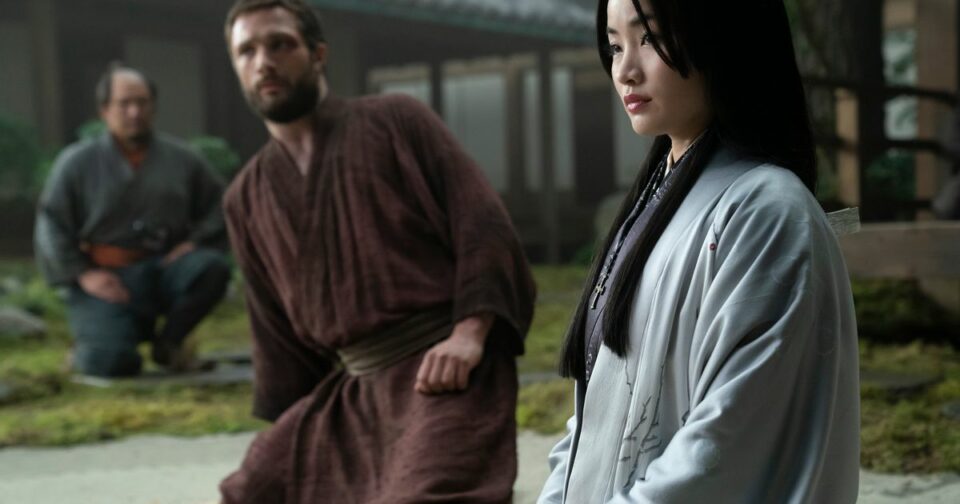If Shōgun’s strength is how subtly it sets up its plot machinations through casual dialogue, as it does in the premiere, then “Servants of Two Masters” is one of the miniseries’ weaker episodes. This is good news for anyone who watched “Anjin” and thought, Wait, what?, as Yabushige, Lady Mariko, and an imprisoned priest (Joaquim de Almeida) all deliver big, bold plot-summary monologues. If you’ve tuned in for sweeping landscapes, gory sword battles, and passionate romance, well, this is not your week.
That doesn’t mean there isn’t any eye candy, however. The scene in which Ishido is dressed by his servants in layers of blue silk shows off how lush the costuming is, complete with intricate golden patterns stitched into his lapels. This is one of the few “show, don’t tell” scenes of the episode, as more silent servants arrive to deliver Ishido official impeachment papers for Toranaga. While he applies his official seal, he keeps eying his set of armor longingly from across the room, clearly yearning for the simplicity of combat. When he brings those impeachment papers to the rest of the council (all Catholics, remember), they refuse to sign because John Blackthorne’s presence as a Protestant Englishman in Japan is an affront to their religion. They demand Blackthorne be put to death and Ishido complains, “This morning I woke up and saw us as Toranaga must see us: Bureaucrats.”
That bureaucracy is front and center as the push-pull of Shōgun as a historical epic and a quiet prestige drama becomes somewhat unbalanced in this episode. Taking place almost entirely in small rooms of Osaka Castle (including the flashback opening), “Servants of Two Masters” has the simple goal of laying everything out on the table. The Taikō, as he lies dying in the flashback, tells Toranaga, “The vultures are circling,” explaining how Toranaga is the only one he trusts to keep his heir safe until he comes of age. To prevent a civil war, the Taikō has set up the Council of Regents, and Toranaga hesitantly accepts, knowing that the council’s inability to find consensus will inevitably lead to fighting.
Flash forward, and Blackthorne is back in front of Toranaga, where we left off in the first episode. Father Martin Alvito (Tommy Bastow) has been invited to translate, and Toranaga also invites Lady Mariko to make sure Alvito is translating accurately. Just as Toranaga learns that Blackthorne’s England is at war with Portugal, however, Ishido barges in and subtly suggests Blackthorne should be in prison. Toranaga agrees as the two men engage in twisty yet polite dialogue that hides their true intentions. “I only want to keep the peace,” Toranaga says of jailing Blackthorne, which might as well be his entire character motivation.
Imprisoned at Ishido’s behest, Blackthorne shares a crowded cell with a convicted priest who brings viewers along on a trip out to Exposition City. It’s an uncharacteristically clumsy conversation for this show, but we learn that the Portuguese Jesuits imprison anyone who speaks against them, we get a bit of history about the three Catholic regents (namely, two converted for the wealth and one is a leprosy survivor), and it’s laid bare that Toranaga’s presence at Osaka Castle is as a hostage. “If Toranaga has claimed you as an ally, you’ll never leave Japan alive,” says our doomed, imprisoned priest.
It’s unfortunate how much plot acceleration exists in that jail scene, but it’s easy to understand why the writers chose to be blunt: following who each character is and what their motivations are can be tricky to sort out in a show this sprawling. But when Lady Mariko is summoned to Toranaga’s chambers after their Blackthorne interview, the show’s subtle dialogue clashes with another big, brash explainer. After Mariko meets with Lady Kiri (Yoriko Dôguchi), Toranaga’s wife, and Lady Shizu (Mako Fujimoto), Toranaga’s consort who is pregnant with his son, Toranaga asks her opinion about the barbarian, and Mariko launches into a blunt explanation about how keeping the Protestant Blackthorne alive sows division between Ishido and the Catholic regents. It’s an exchange that sticks out mainly for how it contrasts with the masterful character introductions of the preceding scene: we only learn who Lady Kiri is through her familiar teasing with Toranaga, to which he replies, smiling, “After all these years, she still picks on me.” After such a quiet yet telling moment, Mariko’s summary feels jarringly out of place.
She is right, however, about keeping Blackthorne alive to sow division—that is Toranaga’s plan, and it works. With the Catholic regents refusing to sign the impeachment papers until Blackthorne is dead, Ishido is stuck. “This heretic offends our God,” says Lord Kiyama (Hiromoto Ida). Ishido’s response: “I wonder if you’d be so devoted to this god were it not for the riches that his priests heap upon you.”
And there it is! Bouncing around between well-crafted character interactions and plodding conversations, “Servants of Two Masters” finally hits the crux of the show: the Portuguese trade has made certain Japanese lords very, very wealthy, and that has given the Jesuits a high level of influence over all of Japan. “Silk, gold, and guns. These Jesuits care nothing of men’s souls,” says the imprisoned priest. Later, when Blackthorne is brought before Toranaga again, he explains that Spain and Portugal have divided up the world and declared that all of Japan belonged to Portugal, who had legal, royal mandates to replace its leaders with Catholic ones. This greatly troubles Toranaga (“Did he really say ‘belongs?’”), but more importantly, it’s the first time Toranaga sees Blackthorne as something more than a pawn. Originally, Blackthorne represented access to guns and cannons and was a spanner Toranaga could throw into the gears of the council. With the revelation that the Portuguese have a secret gun-running base in Macau (staffed by converted Ronin, no less), Blackthorne’s knowledge makes him crucial to Japan’s survival.
But just how did Blackthorne earn an audience in front of Toranaga again? Well, that’s the product of even more scheming. When Ishido visits Yabushige, he notes that Toranaga did not invite Yabushige to stay at the castle. Yabushige seems insulted by it, but we also learn that Yabushige served under Ishido—even though these two men have war history together, Yabushige still claims fealty to Toranaga. But is he loyal? He immediately offers up Blackthorne as a potential prize in shoring up Ishido’s army: based on the earlier conversation, Ishido will very likely have to war against the Catholic regents if he wants to seize power himself. Yabushige explains that for Ishido to properly use Blackthorne’s guns and cannons, the English pilot will have to be rescued from his sentence and given back to Toranaga for the time being.
As Blackthorne is marched out to the woods for execution, bandits attack Lord Kiyama’s men. Then, thankfully, Yabushige’s men arrive and slaughter the bandits. “You always seem to be in the right place at the right time,” Toranaga says to Yabushige later. Yabushige reacts strongly to this statement, indicating that he knows that Toranaga knows that Yabushige set up the whole double ambush.
Yabushige literally serving two masters, Toranaga and Ishido, is our most blatant example of the episode’s title, but it goes beyond that. The Catholic regents serve both the council and the Jesuits. Mariko serves both Toranaga and her God (remember, she’s Catholic). And Blackthorne drops a big revelation: he has direct orders to open up trade between England and Japan. Throughout the first two episodes, he declares that he is not a pirate, over and over again. And yet, he served aboard a Dutch privateer ship, whose ship’s logs, now in the hands of the Jesuit priests, detail endless pillaging and plundering of Spanish settlements. It’s clear that Blackthorne has engaged in piracy, but he’s also on a mission to break Portugal’s stronghold over trade with Japan and crush the Catholic church in doing so. He is both Dutch pirate and English emissary.
That ship’s log is damning evidence both for Blackthorne (showing his terrible deeds) and for the Jesuits (who need to conceal their world domination plans). In fact, the Jesuits are so afraid of this knowledge that they convince Lord Kiyama to send an assassin after Blackthorne. Of course, Lord Toranaga sets a trap and the attempt is foiled.
The assassination scene is a welcome transition out of Exposition City and back into the show proper: we’ve got zippy action, lots of bloodletting, beautifully shot scenes tracking the assassin through dark hallways, and Toranaga bringing his katana down hard onto the assassin’s neck (literally hiding until it was time to strike, like his falcon). She stumbles as she begins to choke on her own blood, and Blackthorne bursts in to attempt to defend Toranaga, catching a nasty slash on his forearm in the process. Toranaga has already sheathed his sword, however, and uses his scabbard to knock the dying assassin back into a zen rock garden. It’s a brutal scene: he could have easily ended the assassin’s suffering, but he wants the assassin to have a slow death — and that may reveal more about his character than anything he’s said up until this point.
Feudal Gestures
• When Mariko is summoned to Toranaga’s chambers, he says to his wife, “Don’t bother my guest, Kiri.” She responds, “Kiri no kata, please, I’m an old woman and I need a lot of respect before I’m dead.” This is another example of the intimacy between Toranaga and Kiri—when he uses her informal name, she reminds him to add the honorific.
• When he’s dying, the Taikō mentions that Lady Ochiba, the mother of the heir, should have been Toranaga’s wife. Then he recalls a phrase they used after drinking too much sake, which I thought was great: “We’ve shit too many times in the same pot to piss on our own feet.” There’s some tension between Lady Ochiba and Toranaga, and we can see it in her stern glances towards him.
• Though it’s not stated in the show, the official companion podcast mentions that both Ishido and the Taikō came from a peasant background and had to fight their way to the top while Toranaga came from a royal family. This adds to the weight of Ishido staring at the Taikō’s armor after admiring his own, more humble set.
• Director Jonathan van Tulleken also mentions on the podcast that most of the show was shot in chronological order, so as John Blackthrone becomes more familiar with Japanese, Cosmo Jarvis, the actor who plays him, is also learning Japanese and can understand more of the lines as they’re spoken to him. Neat!
• Tadanobu Asano as Yabushige really steals the show—his facial expressions and vocal ad-libs add tons of dimension to Yabushige’s personality on screen, and it’s great seeing a guy as brutal as him be a little goofy from time to time.
Jesse Raub , 2024-02-28 06:10:45
Source link


